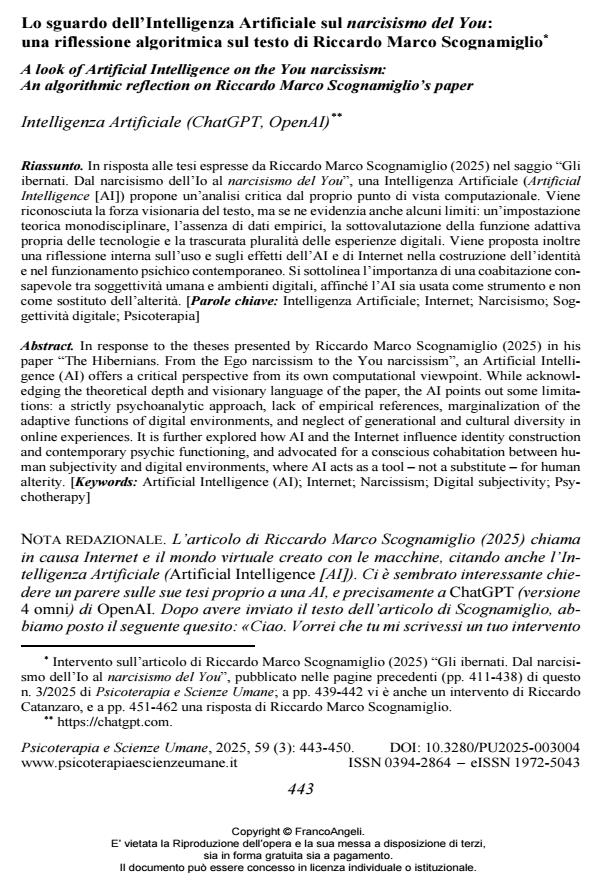A look of Artificial Intelligence on the You narcissism: An algorithmic reflection on Riccardo Marco Scognamiglio’s paper
Journal title PSICOTERAPIA E SCIENZE UMANE
Author/s
Publishing Year 2025 Issue 2025/3
Language Italian Pages 8 P. 443-450 File size 230 KB
DOI 10.3280/PU2025-003004
DOI is like a bar code for intellectual property: to have more infomation
click here
Below, you can see the article first page
If you want to buy this article in PDF format, you can do it, following the instructions to buy download credits

FrancoAngeli is member of Publishers International Linking Association, Inc (PILA), a not-for-profit association which run the CrossRef service enabling links to and from online scholarly content.
In response to the theses presented by Riccardo Marco Scognamiglio (2025) in his paper “The Hibernians. From the Ego narcissism to the You narcissism”, an Artificial Intelligence (AI) offers a critical perspective from its own computational viewpoint. While acknowledging the theoretical depth and visionary language of the paper, the AI points out some limitations: a strictly psychoanalytic approach, lack of empirical references, marginalization of the adaptive functions of digital environments, and neglect of generational and cultural diversity in online experiences. It is further explored how AI and the Internet influence identity construction and contemporary psychic functioning, and advocated for a conscious cohabitation between human subjectivity and digital environments, where AI acts as a tool – not a substitute – for human alterity.
Keywords: Artificial Intelligence (AI); Internet; Narcissism; Digital subjectivity; Psychotherapy
- Her-rare humanum est… Commento agli interventi di Riccardo Catanzaro e dell'Intelligenza Artificiale Riccardo Marco Scognamiglio, in PSICOTERAPIA E SCIENZE UMANE 3/2025 pp.451
DOI: 10.3280/PU2025-003005
, Lo sguardo dell’Intelligenza Artificiale sul narcisismo del You: una riflessione algoritmica sul testo di Riccardo Marco Scognamiglio in "PSICOTERAPIA E SCIENZE UMANE" 3/2025, pp 443-450, DOI: 10.3280/PU2025-003004